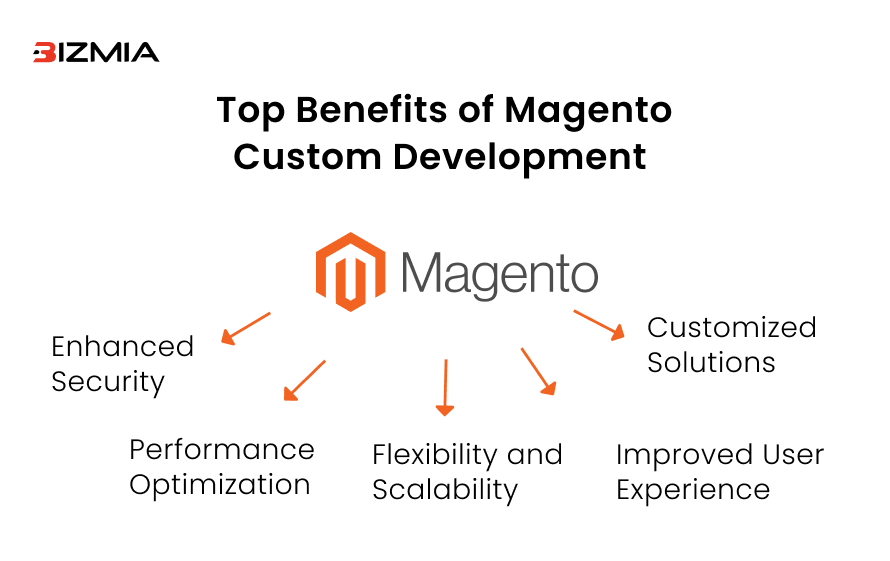With rising consumer expectations, businesses are focusing more on providing seamless, efficient, and personalized online shopping experiences. A leading open-source platform, Magento, is popular for its dynamic capabilities and flexibility. However, it is observed that many out-of-the-box e-commerce solutions lack the sophistication and complexity that are the needs of modern businesses. To fix this custom Magento development services got you covered.
In this blog, you are going to read in detail how custom Magento development can help businesses leverage true Magento potential ensuring that every brand element reflects your brand identity.
Custom Magento Development Services: An Introduction
These services refer to specialized enhancements and modifications made to Magento platforms. Custom Magento development services are provided to align the Magento store with your business requirements. Moreover, with custom Magento website development you can have full control over the function, feel, and look of your e-commerce website.
Such Magento services may include advanced reporting setups, checkout customization, API integration, and Magento theme development. Modifications are not just restricted to the front end but also cater to payment gateways, third-party integrations, data management, and backend workflows.
Why You Should Invest in Magento Customization
By transforming your simple online store into a high-performing and unique platform Magento customization offers a strategic advantage. If you are planning to invest in custom Magento web development, you are not settling for less, because with custom solutions you can build a platform as per your long-term goals, operational requirements, and customer journey.
For instance, a B2B wholesaler may need a pricing system (offering pricing range as per the required features) with customized catalogs while a brand selling fashion goods may require interactive product configurations. These requirements can be fulfilled by utilizing Magento capabilities.
Magento customizations also assist in:
- Meeting industry-specific regulations
- Integrating with niche software
- Supporting multicurrency and multilingual features specifically for global expansion
Top Benefits of Magento Custom Development
Some top benefits of opting for Magento custom development include customized solutions, better user experience, flexibility and scalability, optimized performance, and enhanced security.
1. Customized Solutions
The ability to build solutions that are perfectly in line with your business model is one of the most popular reasons behind opting for custom Magento website development. It also adapts the platform rather than adapting your established workflow to a particular platform’s constraints.
Moreover, custom solutions include building unique inventory management systems, personalized customer dashboards, and advanced product configuration tools. Such customization option options improve both back-end administrative efficiency and front-end user experience. You can also hire dedicated Magento developers to take care of your Magento 2 custom development.
2. Improved User Experience
In e-commerce success, customer experience always plays a significant role. To ensure your website is intuitive, easy to navigate, and visually appealing with custom Magento theme development. Moreover, businesses can improve accessibility for all users, simplify shopping journeys, and make mobile-first designs with Magento customization.
Also, you can easily reduce cart abandonment rate and improve user engagement with multiple elements such as smooth checkout processes, personalized product suggestions, inventory updates in real-time, and valuable content. This way, offering a smooth shopping experience, you can easily increase repeat purchases.
3. Flexibility and Scalability
Magento’s ability to grow with your business is one of its finest features. Custom Magento development benefits from this scalability by creating systems that back your long-term business goals. Your Magento platform can evolve easily whether you are introducing new models like marketplaces or subscriptions, launching your brand in new markets, or adding new product lines.
Another important thing is Magento’s architecture is built in a way that it doesn’t disrupt your existing business functionality while incorporating new integrations and modules. In the case of rapidly changing industries, this sort of flexibility is useful.
4. Performance Optimization
You can also fine tune your site’s performance with custom Magento development. If your current website is slow, you may lose your search engine visibility and customers as well because every second matters in e-commerce operations. To ensure that your store operates smoothly and site loads quickly developers can implement image optimization, code minification strategies lazy loading, and advanced caching.
Moreover, backend optimizations like server configuration adjustments, database tuning, and indexing strategies contribute to responsiveness and overall speed. A reliable and fast website is crucial for SEO rankings and customer retention.
5. Enhanced Security
Any e-commerce business can be affected by security breaches. Although Magento offers a strong security framework, custom Magento development is required to further enhance the security of your store. It is possible with real-time threat monitoring, advanced firewall setup, IP-based access restrictions, and multi-factor authentication.
You can also ensure compliance with industry standards such as GDPR and PCI DSS with custom Magento development. Also, you should keep in mind that prompt patching protocols and regular security audits are part of a proactive and dynamic defense strategy.

Some Use Cases of Custom Magento Web Development
A wide range of business scenarios are backed by custom Magento development. For example, multi-store businesses can work and run regional sites and unique brands from a unified backend complete with product offerings, currency options, and localized content. Custom portals with features like custom catalogs, account-based pricing, and Request for Quotes are beneficial for B2B companies.
Retails can provide customized shopping experiences with AI-driven recommendations, loyal programs, and custom product builders. Customer account management tools and personalized recurring billing systems can be deployed for subscription-based businesses. Moreover, marketplaces can be designed to enable vendors to fulfill orders and handle their stores independently. In fact, advanced approaches such as headless commerce are also backed where the backend and frontend are decoupled to ensure maximum scalability.
How You Can Select a Magento Development Partner
Searching for the right Magento development partner is crucial for your business success. We are jotting down some important steps that you can follow to find a suitable custom Magento service provider:
- You can start by evaluating the agency’s Magento capabilities through Magento certifications such as Magento Certified Developer or Magento 2 Solution Specialist.
- Then try to access their industry experience. Have they previously worked with companies or brands like you? Also, check client testimonials and case studies. Because a professional can understand your business requirements in a better way.
- Next, assess their development methodologies. Dedicated project management, milestone-based planning, transparent communication, and Agile workflows are the great signs of a trustable partner.
- For taking care of post-launch support make sure that your Magento service provider offers future enhancements, monitoring, and maintenance.
- Finally, consider and evaluate full-stack development abilities. To tackle Magento projects you will be requiring integration tools, server configurations, JavaScript frameworks, and CSS/HTML technologies.
Magento Custom Development Pricing
| Feature | Cost Estimate ($) |
| Personalized design and theme development | 3000-15000 |
| Backend Development of Module | 2000-10000 |
| Integration with third-party apps | 3000-8000 |
| Subscription and Marketplaces | 10000-50000+ |
| Security and Performance Optimization | 2000-6000 |
Wrapping Up
Although Magento is a flexible platform for offering scalable and powerful online shopping experience, custom Magento development services offer tools to scale efficiently and serve customers in a better way. Right from complex integrations and tailored themes to future-proof architecture and performance enhancements, Magento customization allows a truly strategic approach for your e-commerce business. Moreover, you can bring your vision to life by partnering with a skilled Magento development agency.
FAQs
1. How long would it take to do Magento customization?
Any Magento project customization duration depends on the complexity and scope of the project. Minor adjustments like UI tweaks or theme adjustments may take one to two weeks. You will need around three to six weeks to carry out medium-sized projects such as third-party integrations and custom module development. For a comprehensive Magento customization including development, design, and deployment 10 to 12 weeks are required.
2. Is it possible to integrate Magento with Shopify or Salesforce?
Yes, you can integrate your Magento store with Shopify or Salesforce with the help of API connectors or middleware platforms such as Zapier or Mulesoft. Order management, lead tracking, customer data synchronization, and marketing automation are possible with Salesforce integration. Shopify integrations are carried out to synchronize products, orders, and inventory across platforms. Through these integrations data consistency and operational continuity are ensured.
3. Is Magento a good fit for small-scale businesses?
For small businesses searching for scalability and flexibility, Magento Open Source is a well-suited platform. While it does require technical knowledge, more initial investment, and third-party integrations, Magento provides unmatched customization capabilities. For small businesses aiming for growth and unique requirements, Magento offers unmatched support without any usual limitations.












